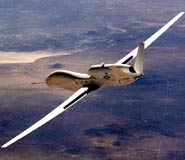Entered into the database on Sunday, January 29th, 2006 @ 12:55:39 MST
The US military's use of drones in Iraq is at least now heard of, if
still languishing in obscurity for most, but today the LA Times reports
that the CIA is intensifying and expanding their use in other situations, like
the attack in Pakistan. These are used for targetted killings in Iraq,
Afghanistan and Yemen. The drones are deployed in "lawless pockets"
of the Middle East, Asia and Africa, where troops dare not venture. This, of
course, guarantees the killing of innocents, such as in Pakistan. The US claims
the right to unleash such attacks across the world as part of the 'war on terror',
and there is actually a 'debate' presented about where and when this can be
done: Some critics, including a U.N. human rights watchdog group and Amnesty International,
have urged the Bush administration to be more open about how it decides whom
to kill and under what circumstances. A U.N. report in the wake of the 2002 strike in Yemen called it "an
alarming precedent [and] a clear case of extrajudicial killing" in violation
of international laws and treaties. The Bush administration, which did not
return calls seeking comment for this story, has said it does not recognize
the mandate of the U.N. special body in connection with its military actions
against Al Qaeda, according to Amnesty International. "Zawahiri is an easy case. No one is going to question us going after
him," said Juliette N. Kayyem, a former U.S. government counter-terrorism
consultant and Justice Department lawyer. "But where can you do it and
who can you do it against? Who authorizes it? All of these are totally unregulated
areas of presidential authority." "Paris, it's easy to say we won't do it there," said Kayyem, now
a Harvard University law professor specializing in terrorism-related legal
issues. "But what about Lebanon?" Paul Pillar, a former CIA deputy counter-terrorism chief, said the authority
claimed by the Bush administration was murky. "I don't think anyone is dealing with solid footing here. There is legal
as well as operational doctrine that is being developed as we go along,"
Pillar said. "We are pretty much in uncharted territory here." This is not 'uncharted territory' at all. In 1986, the US
bombed targets in Lebanon and killed 100 people - the justification was 'preemptive':
"self-defense against future attacks". Article 51 of the UN Charter
was invoked. (Ironically, when the Libyans captured two pilots who had bombed
Libya and killed 37 people, it was used as an excuse to reject a Libyan offer
to release those falsely accused of the Lockerbie bombing for trial in some
neutral venue: to a judge nominated by the UN, at the Hague "under Scottish
law" - exactly what transpired in the end, in however farcical circumstances).
Aside from which, it is easy to see how this can be used as a tactic in other
wars. Consider: the US bombs and kills "Islamist militants" in, say,
Uzbekistan. Despite the fact that there is no threat to the US there, it can
be justified as a strike against 'terrorism'. The opposition in Uzbekistan is
largely not composed of Islamists, yet any such strike could be portrayed as
an attack on 'Al Qaeda'. Subsequently, and surreptitiously, the tactic is used
in other counterinsurgency campaigns, such as the one to crush the Maoists in
Nepal, or Farc in Colombia (already, Dyncorp uses these planes to dump poison
on coca growers in Colombia).
Drones - coming to a civil war near you.